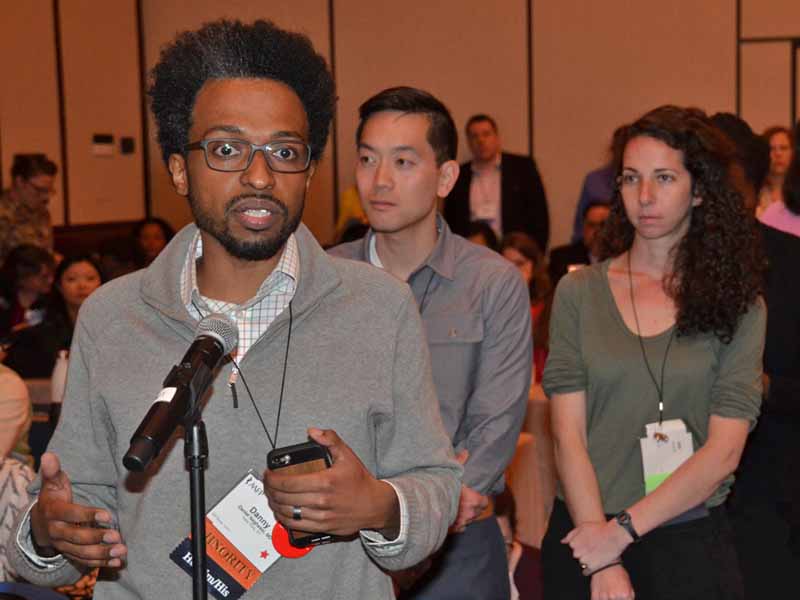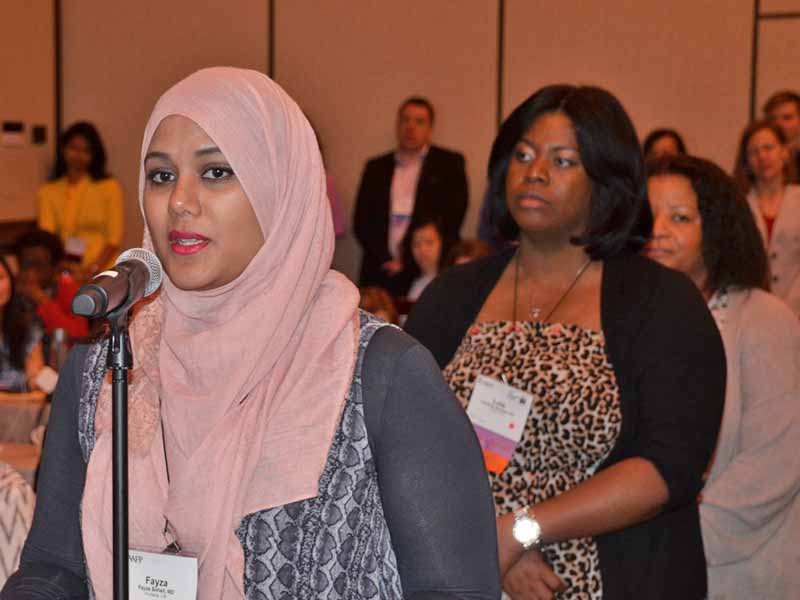Delegates Focus on Race in Medicine, Gender-affirming Care
May 01, 2019 03:40 pm Chris Crawford Kansas City, Mo. – During the 2019 National Conference of Constituency Leaders held here April 25-27, AAFP members from the five constituency groups -- women, minorities, new physicians, international medical graduates, and LGBT physicians and those who support LGBT issues -- acted on resolutions considered by the Reference Committee on Health of the Public and Science.
Among resolutions discussed during the April 26 reference committee hearing were a handful that focused on race in medicine and gender-affirming care.
Eliminate Race-based Medicine, Implicit Bias
A group of resolutions adopted during the business session on April 27 focused on taking race out of medicine to further promote health equity.
One substitute resolution adopted asked the AAFP to create a policy that speaks against the use of race as a proxy for biology or genetics in management guidelines -- instead identifying race as a social construct.

During the Reference Committee on Health of the Public and Science hearing, Daniel Neghassi, M.D., a minority delegate from New York, N.Y., explains a resolution he co-authored that opposes the use of race as a proxy for biology or genetics in medicine -- instead identifying race as a social construct.
The measure also called for the Academy to support members in critically evaluating the use of race in studies and support research to investigate indicators other than race to stratify medical risk factors.
Finally, the substitute resolution asked the AAFP to advocate that estimated glomerular filtration rate be reported without regard to race, including by working with other medical groups such as the American Society of Nephrology.
Story Highlights
Resolution co-author Daniel Neghassi, M.D., a minority delegate from New York, N.Y., explained during the reference committee hearing that race as a proxy for biology or genetics is apparent in EGFR measurement, with different values for patients who are African American versus those who are non-African American.
"There is implicit danger in that it's steeped in saying there is biological basis for this," he said, explaining that there isn't. "And there is an explicit danger in that African American patients, especially young ones, may be assessed to have less severe chronic kidney disease than they do. They can get interventions at lower rates, and that could affect their outcomes."
Another substitute resolution delegates adopted charged the AAFP with creating a toolkit on implicit bias that can be used to educate the entire health care delivery team.
Additionally, the resolution asked that the AAFP provide training on the topic via various means, including through CME, a performance improvement activity, problem-based learning sessions or other options. The resolution went on to suggest the Academy work with the Liaison Committee on Medical Education and the Accreditation Council for Graduate Medical Education to create a curriculum for implicit bias training.
According to resolution co-author Fayza Sohail, M.D., a minority delegate from Portland, Ore., implicit bias is something all family physicians have; some of it is benign and some is not.
And although the resolution authors recognized that the AAFP has officially defined implicit bias and made efforts to highlight the issue, "We ask that this effort be delivered to a wider audience," Sohail said. "So not just to the physicians touching patient care, but also everyone from the front desk to the administrators who are also affecting patient care."
Finally, a third substitute resolution that delegates adopted called on the AAFP to develop an anti-racism policy that includes verbiage encouraging members to participate in training on racism and implicit bias and to identify structural racism in their practices.

Fayza Sohail, M.D., a minority delegate from Portland, Ore., discusses a resolution she co-authored, saying that implicit bias -- some benign, some not -- is something all family physicians have.
The resolution also directed the Academy to ask the LCME to add race to the existing cultural competence and health care disparities section of its structure and standards for accreditation document, as well as asking the corresponding governing body for education programs leading to the D.O. degree to do the same.
Resolution co-author Natalie Hinchcliffe, D.O., a general registrant from Cleveland, pointed out that anti-racism is different from implicit bias and involves actions that are taken to address active instances of racism.
Support Gender-affirming Care
Another group of resolutions focused on a popular theme at NCCL: gender-affirming medical care.
One resolution that delegates adopted asked the AAFP to advocate that EHR vendors include sexual orientation and gender identity fields in their products.
Resolution co-author Melissa Hidde, M.D., an LGBT delegate from Green Bay, Wis., said the authors want EHR developers and vendors to not only include fields for sexual orientation and gender identity, "but also that health care entities activate these fields, utilize them and train their staff appropriately to use them."
A related substitute measure that also was adopted tasked the AAFP with, among other things, opposing any legislation that limits medical decision-making in gender-affirming care for children and adolescents.
"If the AAFP believes that we should help our patients get to the highest potential of their health, then gender-affirming care is extremely effective, and our legislators have no place in the discussion between physicians and patients," said resolution co-author Brent Sugimoto, M.D., M.P.H., an LGBT delegate from Richmond, Calif.
A third adopted resolution charged the AAFP with including gender-neutral language in its publications and producing patient education materials that use gender-neutral language, as well.
Furthermore, the resolution called for the Academy to advocate use of gender-neutral language in materials from third parties that AAFP members use in their practices.
Resolution co-author Jessica Heselschwerdt, M.D., an LGBT delegate from Okemos, Mich., said the reason the authors specified patient-oriented materials as well as AAFP publications is because family physicians who take care of transgender and nongender-conforming patients face issues specific to these patients.
"A lot of these patients own a uterus and a cervix but may not identify as female," she said. "So, I have a really hard time finding materials for them regarding Pap smears and on reproductive options."
Finally, delegates reaffirmed as current policy a resolution calling for the AAFP to support gender-affirming medical care for children and adolescents, including puberty suppression and hormonal treatment, as part of the scope of family medicine.
Additional Issues
Among other measures considered by the reference committee, NCCL delegates adopted resolutions directing the Academy to
- work to improve access to care for homebound patients,
- support standardized front-of-label food packaging,
- advocate abolishing corporal punishment in schools, and
- raise awareness about family medicine's role in addressing/preventing sexual harassment.
Related AAFP News Coverage
2019 NCCL
Member Constituency Delegates Reject Purity Politics for PAC
(4/30/2019)
2019 AAFP Leadership Conference
Family Physicians Voice Questions at Town Hall Meeting
(4/30/2019)
2019 NCCL Delegates Elect New Leaders
(4/27/2019)
2019 NCCL
Family Physicians Learn to Say 'Yes, And …'
(4/26/2019)